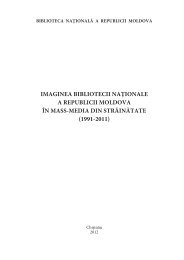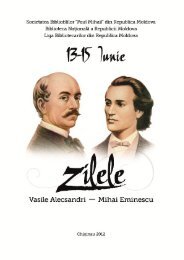download - Biblioteca NaÅ£ionalÄ a Republicii Moldova
download - Biblioteca NaÅ£ionalÄ a Republicii Moldova
download - Biblioteca NaÅ£ionalÄ a Republicii Moldova
Create successful ePaper yourself
Turn your PDF publications into a flip-book with our unique Google optimized e-Paper software.
Economie<br />
and attention. It lacks central Europe’s glorious culture,<br />
the pungent romance of the Balkans, the charm and excitement<br />
of the Baltics, or the huge strategic importance<br />
of Central Asia and the Caucasus. Its main role is that<br />
of a country so obscure that it can safely be ridiculed,<br />
as it was in a book about a hapless British comedian’s<br />
attempt to play tennis with the national football team.<br />
<strong>Moldova</strong> is indeed flat, small, isolated, and ill-run.<br />
But it is not ridiculous. Its sadnesses spill over to other<br />
countries in the form of smuggling and prostitution. Bits<br />
of it—chiefly the breakaway puppet state of Transdniestria<br />
- are sinister. Its fate is tremendously important. As<br />
it wobbles between east and west, <strong>Moldova</strong> may be the<br />
first country that the Kremlin wins back from the west<br />
since the 1970s. Simply getting there is quite hard. Deplorable<br />
state interference (to protect the national carrier)<br />
means that the low-cost European airlines that fly<br />
to the farthest corners of countries such as Poland don’t<br />
serve the <strong>Moldova</strong>n capital, Chisinau. Municipal corruption<br />
means that no western hotel chains have opened.<br />
The best one is an ex-brothel, built for Turkish clients.<br />
After four lucrative years, the owners changed its name<br />
and went respectable, more or less.<br />
The best way to get to <strong>Moldova</strong> is from Romania.<br />
Ties between these two countries ought to be the closest<br />
anywhere in eastern Europe. They share, broadly<br />
speaking, a common language and history. <strong>Moldova</strong><br />
was part of Romania until 1940, when Stalin grabbed it<br />
as part of the Nazi-Soviet pact.<br />
Romanians mostly find it hard to think of <strong>Moldova</strong> as<br />
a separate country: rather the same way many English<br />
used to feel about Ireland, and still do about Scotland<br />
and Wales. Romania’s beleaguered (and currently suspended)<br />
president, Traian Basescu, a cheerful former<br />
sea-captain, sees <strong>Moldova</strong> as a failed experiment that<br />
would be much better off rejoining Romania. His views<br />
would be fine in his old job, discussed in a lively harbourside<br />
bar, lubricated by a few glasses of Romania’s<br />
national drink, tuica. Coming from a head of state, amid<br />
the delicate levantine gold filigrees and white plaster of<br />
the former royal palace, they sound crass.<br />
Only the most flimsy euphemisms disguise his real<br />
views: <strong>Moldova</strong> is run by an incompetent provincial Soviet<br />
elite that has lost the confidence not only of the<br />
outside world, but also its own people. They are signing<br />
up for Romanian passports en masse - he reckons<br />
800,000 out of a population of 4.5m. Romania’s newly<br />
won membership of the European Union makes its citizenship<br />
- available to most <strong>Moldova</strong>ns - irresistibly attractive,<br />
and the process of unification unstoppable.<br />
Yet a few moments’ thought show the difficulty with<br />
Mr Basescu’s simplistic notions. Romania struggled to<br />
get into the EU and is now struggling to survive there.<br />
<strong>Moldova</strong> has far worse problems, and is not even in<br />
the waiting room for membership. The last thing the EU<br />
wants is another chunk of dirt-poor, ill-run, ex-communist<br />
nuisance. What would happen to Transdniestria,<br />
the mainly Russian-speaking territory that was stitched<br />
to <strong>Moldova</strong> in Soviet times, and now tries to be independent?<br />
Crucially, reunification with Romania is not popular<br />
in <strong>Moldova</strong>. Mr. Basescu’s views may be coloured by<br />
the rapturous reception he received from his fans there<br />
during a recent visit. But less than a sixth of the population<br />
declare themselves as “Romanians”. The majority<br />
have got used, over the past 50 years, to living in a<br />
separate country. They do not want to go back to being<br />
a neglected province of Greater Romania”.<br />
22
















